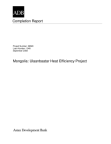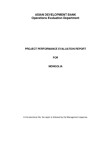The Ulaanbaatar Heat Efficiency Project was developed to address numerous deficiencies and shortcomings in the heat supply as identified in the late 1990s.
Mongolia
Strengthening the Disaster Mitigation and Management Systems in Mongolia Project, Phase II
The overall expected outcome of this project is the improvement of the risk reduction and disaster management capacity of the Mongolian disaster management system at the national and local levels.
Commercialization of Super-Insulated Buildings in Mongolia
Mongolia has a very high emission of CO2 per capita (higher many developed countries); and burning of coal to heat buildings result in serious pollution and related health problems.
Energy and Environment Group
The outcome evaluation is conducted one year before the end of the current country programme which ends in 2006.
Energy Conservation Project in Mongolia (2005)
Adequate heating is essential for survival during the harsh winter in Ulaanbaatar, the coldest capital in the world (average annual temperature of 3 degrees Celsius below zero). Ulaanbaatar's district heating system was established in 1959.
Mongolia - Energy Conservation Project
The Project's strategic objectives were to meet the basic needs of the population and support economic recovery; and promote sec tor efficiency.
Enabling Activities for the Preparation of Initial National Communications Related to the UNFCCC - Mongolia
The project commenced in November 1998 and was originally planned to be completed in two years. However, it had to be extended by one year owing to late start-up and constraints related to weak initial capacities and institutional development.
Provision of Energy Efficient Social Services
The project will help develop social services that are less dependent on non-renewable resources for its energy needs, freeing financial resources for their core activities and giving a significant contribution to the conservation of the natural environment and better rural livelihoods.










